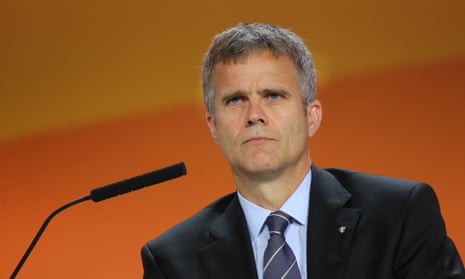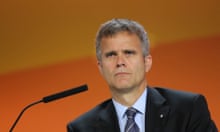The BG Group board has admitted it “did not strike the correct balance” on pay when it offered a £25m package to lure the Norwegian oil boss Helge Lund to the company as chief executive.
A shareholders’ revolt in November forced the oil and gas company’s chairman, Andrew Gould, and its senior non-executive director, Sir John Hood, who heads the remuneration committee, into an embarrassing U-turn. In December they amended Lund’s package to ensure his earnings would be more closely linked to company performance.
Writing in BG’s annual report, published on Wednesday, Hood conceded that directors had not given enough weight to concerns about the levels of executive pay in the UK. Hood said “our objective was to offer remuneration that was competitive in the international market for oil and gas executives”.
He said: “There is a difficult balance to be struck between meeting that objective and taking appropriate account of shareholder and public concern in the UK about the level of executive pay.
“The board recognises that, in designing the original package for Helge, it did not strike the correct balance.”
A further round of consultation took place with shareholders in February. At this point it was agreed that executive performance targets should be expanded. The number of shares received in the long-term rewards scheme will depend on three factors: share price against a group of similar companies, earnings, and return on capital.
Lund’s final package could still be as high as £25m, but only if performance is exceptional. His actual earnings are now likely to be nearer £13m for his first year in office.
Lund started work at BG on 9 February and one month later he was handed 1.2m BG shares. How many he keeps will depend on performance. His new deal includes:
- Base salary of £1.5m
- Cash in lieu of pension of £450,000
- Annual bonus of £1.5m at target, £3m at maximum
- Initial grant of 1,141,011 performance related shares worth £10.6m, only £4.6m worth likely to vest
- Annual grant of performance-related shares of £9m (six times salary), only £4m worth likely to vest
- Compensation for forfeited Statoil shares, in the form of 80,711 BG shares, worth £750,000
- Relocation allowance of £480,000
Lund caught BG’s eye after a stellar 10-year career at the top of Statoil in Norway, transforming it from a local operator into a global force, active in the Gulf of Mexico and the Russian Arctic. Reportedly headed for a career in Oslo politics, he was instead persuaded to move to the UK.
But shareholders were incensed by the deal offered because it did not follow principles set out in a directors’ remuneration policy which the BG board had asked them to approve in May 2014, just five months before Lund’s appointment.
The Institute of Directors branded Lund’s original compensation packages as “excessive, inflammatory and contrary to the principles of good corporate governance”. L&G Investment Management, BG’s fourth biggest shareholder, openly criticised his pay, while a smaller investor described the deal as “a US-sized package to a UK executive”.
Hood has been in the frontline of shareholder activism over recent months. A former vice-chancellor at the University of Oxford, he was brought on to the board of the advertising giant WPP as chair of its remuneration committee in January 2014 to help quell a two-year battle with investors over pay for the company’s founder and chief executive, Sir Martin Sorrell.
Sorrell was the best paid boss in the FTSE during 2013, and is expected to collect nearly £100m in share awards over a three-year period, while also being entitled to earn a maximum of nearly £20m in other pay this year and last.
Hood said of the debacle at BG: “The committee recognises that 2014 has been a particularly important year for the company on remunerations matters, and is grateful for the high level of engagement from shareholders.”



